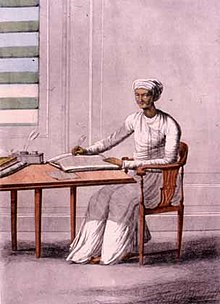Kayastha
Kayastha (also Kayasth or Kayeth , hindi कायस्थ kāyasth) is a name for a Hindu community that traditionally played the role of scribe and official. This is why the Kayastha community is also known as the “scribe caste”. Most of the Kayastha live in the Indian states of West Bengal , Uttar Pradesh , Bihar , Madhya Pradesh and the capital Delhi .
origin
- Mythological interpretation
The Kayastha trace their mythological origin back to the creation of the four castes by Brahma . In order to record the good and bad deeds of humanity, Brahma created Chitragupta. The Kayastha see him as their progenitor.
- Historical explanation
As early as the 7th century AD, the Kayastha are mentioned in scriptures as a caste responsible for writing secular documents and keeping records. At the time of the Mughals , many Kayastha rose to high offices because they had quickly acquired the Persian language. Some of them converted to Islam.
Quote
- "Among the Hindus, the Kāyasth have a long tradition of meritorious, distinguished civil servant work in the Muslim courts, especially in Delhi. They have left their mark not only in administration, but also in the field of writing. The caste has the unique privilege of to have produced a great number of historians and scholars well versed in Persian and Urdu literature. The Kāyasth are famous for their intelligence, sagacity and wisdom. "
- "... the most unorthodox of the Hindu castes "
Well-known people from Kayastha families
- Jagadish Chandra Bose (1858–1937), Indian natural scientist
- Swami Vivekananda (1863–1902), Indian monk and scholar
- Jadunath Sarkar (1870-1958), Indian historian
- Sri Aurobindo (1872–1950), Indian philosopher and guru
- Ganesh Prasad (1876-1935), Indian mathematician
- Premchand , pseudonym for Dhanpat Rai Shrivastava (1880–1936), Indian writer
- Rajendra Prasad (1884–1963), first President of India
- Paramahamsa Yogananda (1893–1952), Indian yoga master, philosopher and writer
- Satyendranath Bose (1894–1974), Indian physicist
- AC Bhaktivedanta Swami Prabhupada (1896–1977), translator and commentator of Hindu scriptures and founder of ISKCON
- Subhash Chandra Bose (1897–1945), Chairman of the Indian National Congress (INC)
- Lal Bahadur Shastri (1904–1966), second Prime Minister of India
- Maharishi Mahesh Yogi (1918–2008), Indian guru and founder of Transcendental Meditation
- Amitabh Bachchan (* 1942), Indian actor
Individual evidence
- ↑ http://www.peoplegroupsindia.com/profiles/kayasth/ . Retrieved September 18, 2016.
- ↑ http://kayasthapariwar.weebly.com/info.html . Retrieved September 18, 2016.
- ^ Arnold P. Kaminsky, Roger D. Long: India Today: An Encyclopedia of Life in the Republic . ABC-CLIO, Santa Barbara 2011, ISBN 978-0-313-37462-3 , p. 404.
- ↑ http://www.kayasthamatrimony.com/articles/a-rich-legacy.php . Retrieved September 18, 2016.
- ↑ http://kayasthapariwar.weebly.com/history.html . Retrieved September 18, 2016.
- ↑ Hari Ram Gupta, Foreword to Life and Letters of Sir Jadunath Sarkar . Hoshiarpur: Panjab University 1957, p. 3; translated from English
- ↑ Ibid., P. 15
- ↑ http://kayasthapariwar.weebly.com/prominent-kayasthas.html . Retrieved September 18, 2016.
